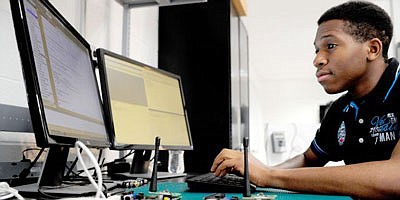Morgan State University (MSU) will participate as one of the lead institutions in a groundbreaking pilot program in engineering education, funded by the National Science Foundation (NSF), according to school officials in a news release.
The program titled, “Engineering for US All – E4USA: A National Pilot High School Engineering Course and Database,” counts as a three-year, $4-million initiative.
It marks an important milestone in the creation of a standardized, nationally recognized high school engineering course through which pre-college students can earn transferable course credits at the college level, said Dr. Jumoke Ladeji-Osias, the co-principal investigator for the program and an associate professor of electrical and computer engineering at MSU.
The program also includes professional development for teachers to support the course.
The E4USA team leaders anticipate that five Baltimore area high schools and 15 in Maryland will participate in the program beginning in the 2019–20 academic year.
“Morgan’s School of Engineering has a long history of involvement in pre-college engineering, and I am grateful to Dean Pines and the NSF for this opportunity to extend that successful track record,” said Dr. Ladeji-Osias. “My work with E4USA is the culmination of the work I’ve done for Morgan at the pre-college level since 2015, partnering with Baltimore area teachers to enhance their skills in teaching engineering-related topics.”
Dr. Ladeji-Osias and Morgan’s School of Engineering will be involved in developing the E4USA syllabus and curriculum, developing standard rubrics for teachers to use in evaluating the students’ progress with the program’s hands-on engineering design products and distance-learning technologies, and working with the professional development team to customize the teacher training, according to school officials.
Through the pilot program, the E4USA investigators will seek to help “demystify” and “democratize” engineering and determine whether a broader diversity of students will become interested in careers in engineering education or practice. Their research will also explore whether professional development can certify teachers who are highly qualified in engineering and help them train students to tackle and solve problems.
As a result of the NSF E4USA grant, more than a 1,000 students, at approximately 40 high schools nationwide, are expected to complete the pilot program during its three-year span. An additional 30 schools will participate indirectly with other funding.
The University of Maryland, College Park will lead the pilot in partnership with Arizona State University, Virginia Tech and MSU. Vanderbilt University will evaluate the curriculum, student learning and teacher training, and NASA Goddard Space Flight Center will collaborate on dissemination of program information. Dean Darryll J. Pines of the University of Maryland’s A. James Clark School of Engineering will also be a principal investigator for the program.
“With STEM and related fields leading the pathway toward the jobs of the future, it has become extremely important to fully prepare the next generations of workers and to begin expanding the talent pool before they even step foot on a college campus, and with innovative programs like E4USA we are placed in a better position to meet this need,” said MSU President David Wilson. “I applaud this collaboration made possible by the National Science Foundation and look forward to the knowledge we all will gain from the research it produces.”
